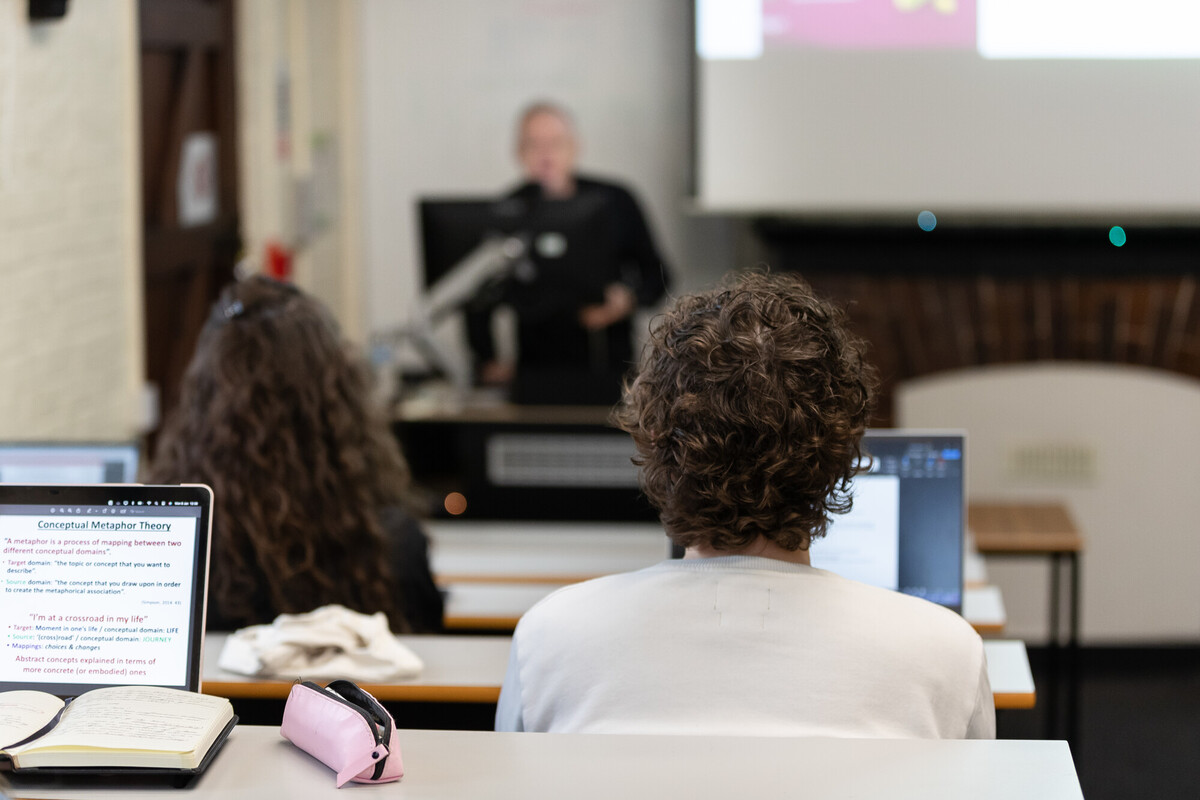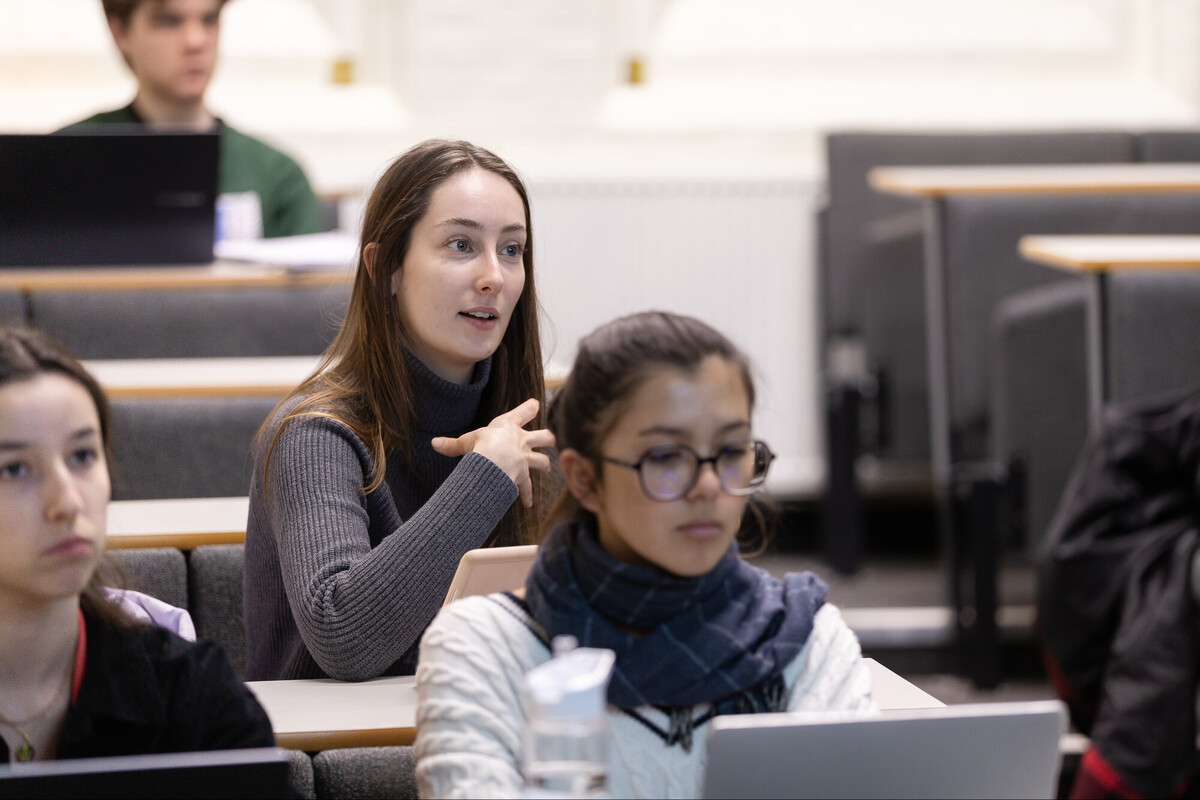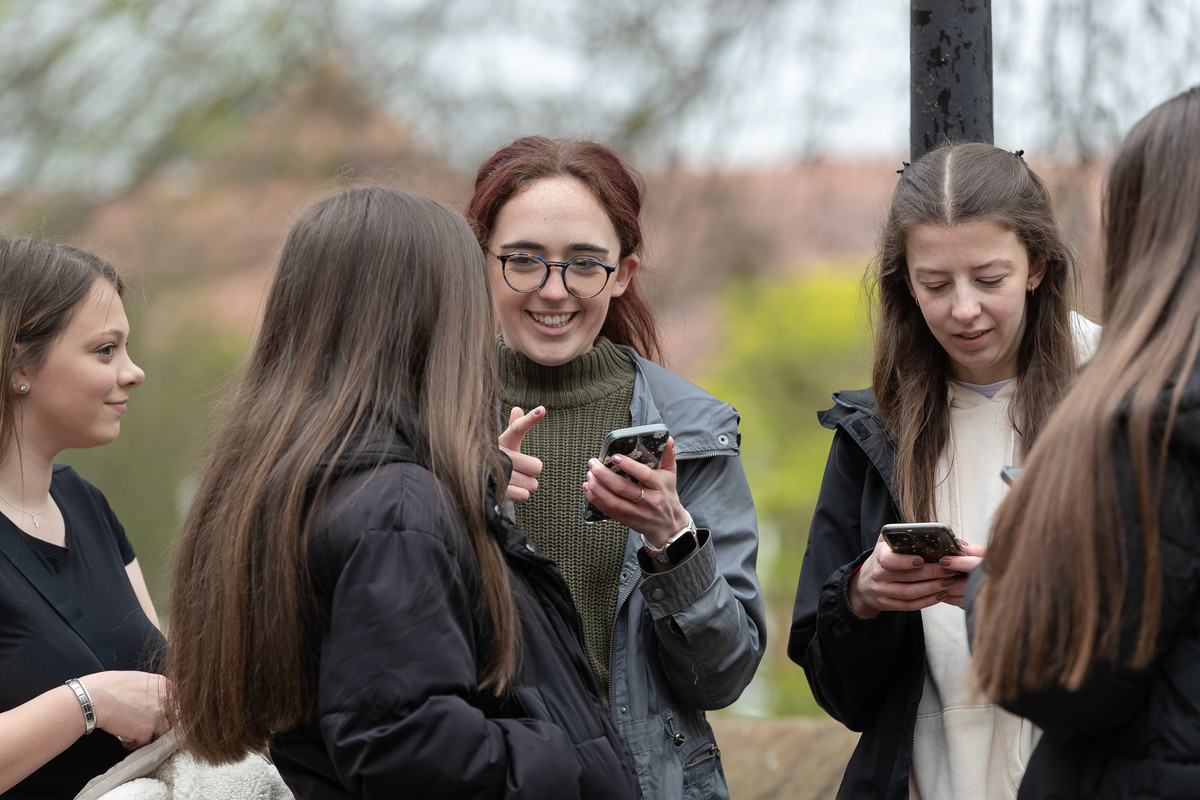English Literature BA (Hons)

Available with:
- Foundation Year
You are viewing Course summary
Course Summary
We are passionate about literature and lecturers at Chester want you to enjoy an exciting, varied and dynamic course. You might find yourself looking for the psychological undercurrents in a fantasy novel, applying feminist theory to a Renaissance sonnet, exploring the motif of the vampire in Gothic fiction, or exploring the treatment of love in Shakespeare’s plays or a contemporary short story. You’ll get the chance to write a dissertation on a topic of your choosing, guided by a dedicated tutor. Along the way, you’ll develop key skills for your future: our students learn how to persuade by developing convincing arguments, communicate effectively and analyse writing in all styles and genres. At Chester, we offer an engaging and supportive atmosphere in which we all can share our ideas about literature.
Your contact hours will include individual tutorials with lecturers, seminars with other students and a tutor, and lectures attended by your whole year. We offer a wide range of coursework assessments: as well as writing essays, you can gain marks for private study projects, oral presentations and creative pieces, depending on the options you choose.
From the second year onwards, you will choose optional modules to enable you to focus on specific aspects of literary history, or explore links between literature and wider issues like crime, fashion, travel and gender. You can customize your degree as you progress, and your tutors will support you every step of the way.
What You'llStudy
Module content:
- Reading and writing critically.
- Constructing and evaluating an argument.
- Note-taking techniques for reading and listening.
- Understanding plagiarism and academic integrity.
- Introduction to reflective practice.
- Preparing for, and delivering, powerpoint presentations.
- Referencing and citation.
- Summarising and paraphrasing written sources.
- Literature searching.
- Report writing.
- The culture and expectations of higher education.
- The assessment process including the role of assessment criteria and feedback.
- The nature of research journal publishing.
Whilst much of the content above is generic, students will be encouraged to situate skills within the context of the undergraduate discipline they are entering, which leads to some variation in emphasis for certain skills.
Module aims:
1.To raise awareness of the range of study skills required for successful higher education studies, including the process of academic writing, reading strategies, seminar skills, organisation of time and materials, planning for and meeting deadlines, understanding and responding to feedback.
2. To introduce students to concepts such as plagiarism, academic integrity and appropriate use of artificial intelligence tools.
3. To facilitate an effective transition into higher education by exploring, and providing guidance in, the key elements of successful undergraduate studentship including students' understanding of taking responsibility for their own learning.
4. To teach students how to undertake a literature, visual or data review for their discipline and be able to differentiate between a valid, reliable source and an unsubstantiated or irrelevant source.
Module content:
- Research and planning skills.
- Becoming familiar with topics that comprise their undergraduate degree subject.
- Developing a knowledge base for a discipline of study.
- Identifying areas of interest.
- Application and development of critical analytical skills.
- Development of self-directed study.
- Use of learning resources.
Module aims:
1. To develop students' skills in planning and writing an essay.
2. To familiarise students with the process of tutor supervision for a written piece of work.
3. To give students an opportunity to focus on a topic within their undergraduate degree subject.
4. To write a piece of work that allows the student to broaden and deepen knowledge on a topic of their choice.
5. To prepare and deliver an academic poster presentation outlining the student's research topic.
Module content:
- The 'global student' and the ‘global graduate’
- Introduction to theories of globalization
- Perspectives on economic, political and cultural globalization
- Globalized media, the internet & digital tech.
- Global economy & transnational corporations
- International organisations & social movements
- Migration, multiculturalism and interculturalism
- Introduction to decolonisation & education
- International security and security issues
- Introduction to international relations theory
Module aims:
1. To explore issues of global significance.
2. To develop and apply skills in critical thinking, research and communication and apply these to debates within the module's topics.
3. To deconstruct and reconstruct arguments by researching global issues.
4. To develop an awareness of global justice debates.
Module content:
- An introduction to creative and critical thinking concepts
- Considering credibility; belief and truth
- Identifying how language is used for persuasion
- Identifying how image is used for persuasion
- Recognising how media is used for manipulation
- An introduction to advertising and marketing techniques
- Representation and misrepresentation of data
- Applying critical thinking skills to contemporary media and technology
Module aims:
1. To introduce approaches to analytical and critical thinking.
2. To develop an understanding of critical thinking when applied to language, image, traditional and online media.
Module content:
- Introduction to semiotics and visual language
- Emerging trends: environment and interiors
- The birth and evolution of cinema
- The human commodity: advertising, celebrity and reality television
- Introduction to postmodernism and popular art
- Photography as social commentary
- The internet and digital spaces
Module aims:
1. To develop students' understanding of western civilization through an understanding of that civilization's visual texts.
2. To develop students' abilities to communicate orally, visually and through academic writing.
3. To develop students' interpretative abilities through the promotion of skills of visual interpretation.
Module content:
- Introduction to the ways that narrative and stories are important in different cultures and contexts
- Introduction to methods of interpreting narratives and stories
- Introduction to key stories and narratives that have shaped cultures
- Introduction to how stories and narratives can change or influence cultures
- Introduction to how stories and narratives are constructed and reconstructed in the twenty-first century
- Introduction to skills in reading texts
Module aims:
- To develop an awareness of a number of key narratives and stories that have influenced cultures
- To understand the various roles that narrative and story-telling have in different cultures and contexts
- To understand the ways that cultures construct meaning through narrative and story-telling
- To develop skills in reading and interpreting narratives and stories
- To develop skills in the close reading of texts
You will be equipped with the knowledge and skills needed to study successfully at degree level. The literature you’ll study is drawn from the Renaissance to the present day and you’ll learn to apply critical approaches to your reading.
Module content:
This level 4 core module is designed to challenge students’ inherited assumptions about literature by focusing their reading through a number of critical and theoretical approaches. The module offers a survey of several ways of reading and is designed to empower students by giving them awareness of critical strategies they may never have thought of before. Throughout, students will be encouraged not to accept critical theories passively as received wisdom, but to challenge their relevance and validity, forming a pragmatic understanding of which approaches are most useful and workable in different contexts. The emphasis will be on the application of theory to the students’ critical practice, achieved through a balance between the discussion of literary theory (normally through secondary explanations, but also involving some primary theory) and the close reading of literary texts. The devotion of the whole module to criticism and theory allows a degree of specialisation to complement the students’ more general foundational work. A new theoretical approach will be introduced every two weeks, allowing one week for discussion of the asynchronously available seminar materials and lecture, and another week for the application of said critical ideas to the selected literary texts.
Module aims:
- To demonstrate the relevance of particular theories or critical approaches to the interpretation of literary texts.
- To develop a basic awareness of how texts can be read in different ways.
- To encourage an understanding of some of the significant preoccupations of critics and thinkers about literature.
- To enable students to gain a foundational knowledge of several critical approaches.
Module content:
This core module for Single Honours English students is designed to provide an introduction to contemporary literature. Focussing on a range of contemporary writers, the module provides the key skills necessary for degree-level literary analysis. The module is also interested in the creation and expansion of the canon: how texts become part of literary history, or fall silent; and why certain texts are prioritised for study at university. Further to enhancing their critical reading skills, students will develop a more profound understanding of the canon and literary ‘value’, and of the difference between personal opinion and critical opinion. The module will look at the works of established (canonical) authors (such as Harold Pinter and Ian McEwan) and prize-winning texts (such as Barnes's The Sense of an Ending and McCarthy's The Road), exploring the judgement of literary merit that led to their success. But the module will also consider new work by authors not yet established (such as short stories published by Flash: The International Short-Short Story Magazine).
Module aims:
- To introduce students to a range of contemporary literature.
- To enhance students’ ability to use a range of techniques, tools and terms useful in the analysis of literature at degree level.
- To develop students’ awareness of the creation and expansion of the literary canon.
- To encourage students to reflect on the relationship between critical analysis and ‘value’, and the difference between personal opinion and critical opinion.
Module content:
In this module, students will read, discuss and write about a variety of fiction by a range of authors writing in a number of different forms. Students will pay close attention to individual texts while thinking about each text in its cultural and literary context. Students will also be encouraged to consider connections and contrasts between the texts studied. The module serves as an introduction to a variety of fiction writing and engages at a foundational level with its complexities.
Module aims:
- To introduce students to a variety of fictional forms.
- To examine the use made by different authors of the techniques of fiction writing.
- To explore the ways in which fiction relates to its cultural context.
- To enable students to understand the distinctive characteristics of fiction writing.
Module content:
This first of two foundational core modules that are the basis for all students of English at level four. Using a range of texts (poetry, a novella and a novel, studied in detail) from the Romantic to the late Victorian period, the module introduces students to the key skills of literary analysis required at degree level. The module will explicitly consider the skills involved in reading, writing essays, using secondary sources and understanding context at university, as well as introducing students to the important foundational techniques, tools, and terminology of literary criticism. In seminars and tutorials, students will focus on the discussion and analysis of individual texts, for example, Romantic poetry, The Turn of the Screw and Northanger Abbey. The lecture programme will complement the seminars and tutorials: lectures will cover, for example, individual authors, genre, context, literary periods, learning resources and study skills.
Module aims:
- To introduce students to the key forms of literary writing (poetry and prose).
- To introduce students to a range of techniques, tools and terms useful in the analysis of literature at degree level.
- To introduce students to the learning resources available to them, including using secondary sources and understanding context.
- To ensure students are aware of the key skills involved in active and critical reading, as well as researching and writing essays at university.
Module content:
This second of two foundational core modules is the basis for all students of English at level four. Using a range of texts (a play, a novel and short stories, studied in detail) from the Renaissance to the present day, the module introduces students to the key skills of literary analysis required at degree level. The module will explicitly consider the skills involved in reading, writing essays, researching historical periods and modern-day texts at university, as well as introducing students to the important foundational techniques, tools, and terminology of literary criticism. In seminars and tutorials, students will focus on the discussion and analysis of individual texts, for example, Twelfth Night, Atonement, the short stories of Edgar Allan Poe. The lecture programme will complement the seminars and tutorials: lectures will cover, for example, individual authors, genre, context, literary periods, learning resources and study skills.
Module aims:
- To introduce students to key forms of literary writing (drama and prose).
- To introduce students to a range of techniques, tools and terms useful in the analysis of literature at degree level.
- To introduce students to the learning resources available to them, including researching historical periods and modern-day texts.
- To ensure students are aware of the key skills involved in active and critical reading, as well as researching and delivering presentations, and preparing for examinations at university.
Building on your first year, Year 2 will offer you opportunities to pursue the study of literature that most interests you, as in the second year you will choose five modules from a selection of options.
Module content:
The module explores a wide range of Gothic novels, short stories, poetry and film from the late-eighteenth century to the present day. Students will investigate the distinctive features of the Gothic genre in literature in relation to historical, cultural and literary contexts; for example, students may explore the role of the Gothic in Romantic poetry, or its relationship to ideas of the Sublime, or nineteenth century fin-de-siècle preoccupations with degeneration, or the relationship between the Gothic and Horror or Magic Realism in contemporary literature. The module will enable students to further their knowledge of literary history through analysis of the continuities and developments of Gothic themes and conventions, and to critically consider the issue of the relationship between 'high' and 'popular' culture. The module examines the Gothic genre via a range of critical and theoretical approaches which explore relevant issues such as gender, politics, sexuality, race, class, religion and psychoanalysis. Texts studied may typically include Frankenstein, 'The Fall of the House of Usher', 'Carmilla', The Strange Case of Dr Jekyll and Mr Hyde, Dracula, The Shining, and Let the Right One In.
Module aims:
- To introduce students to the Gothic genre, raising awareness of the relationship between Gothic literature and wider historical and cultural contexts.
- To enable students to critically analyse a range of Gothic texts from the eighteenth century to the present.
- To enable students to apply theoretical and critical approaches to the study of Gothic texts and conventions.
- To encourage students to develop an awareness of the Gothic in relation to both popular and élite cultures.
Module content:
This module provides an in-depth study of a range of poetry, fiction, drama, and non-fictional texts of the Victorian period (roughly 1837-1901), encouraging the application and development of skills of analysis acquired during Level 4. The module explores the relationship between Victorian literary texts and their historical and publishing contexts, and introduces students to the dominant genres and ideas of the age. Students will encounter some of the major literary modes of the Victorian period (such as Realism, the 'Social Problem' novel, the dramatic monologue, the Gothic, Sensationalism, periodical literature,
etc.), and some of its key preoccupations (the 'Condition of England', the Empire, national and racial identity, the 'Woman Question', sexuality, the supernatural, religious belief and doubt, science and technology,
etc.). Writers studied on the module may include, for example: the Brontës, Elizabeth Barrett Browning, Robert Browning, Charles Dickens, George Eliot, Elizabeth Gaskell, Thomas Hardy, Christina Rossetti, George Bernard Shaw, and Oscar Wilde.
Module aims:
- To explore the rich literature of the Victorian period and encourage an awareness of its thematic and generic diversity.
- To situate a wide range of Victorian texts in relation to their historical and cultural contexts.
- To analyse in detail some of the key preoccupations of Victorian literary texts.
- To engage critically with current scholarship on and theoretical approaches to Victorian literature.
Module content:
This module considers how gender, as a core facet of identity, is defined and redefined in and by literature, film and popular culture. Students will be equipped with key gender theorists’ ideas in order to enable them to consider gender’s role in their own lives. Further, the module enables students to bring to bear a gendered lens when considering the construction of identity in a wide range of texts (including books, films, news stories, and music videos). It builds on the work many of the students will have done in their first year, considering gender’s function in literature, and it encourages creativity through its assessment options. The module’s key concerns – gender and identity – and its intersectional approach – make it entirely consistent with wider University initiatives around decolonizing the curriculum. Texts and theorists studied may typically include extracts from foundational works like Judith Butler’s Gender Trouble; Laura Mulvey’s theories of the gaze; or Kimberlé Crenshaw’s ‘Mapping the Margins’; and more recent books and articles by, for example, Kate Manne (Entitled), Chandra Mohanty (‘Under Western Eyes Revisited’) or Sara Ahmed. Online materials and resources such as the Everyday Sexism and Hollaback! projects will also be employed.
Module aims:
- To introduce students to key gender theories, raising awareness of the relationship between gender and identity in wider historical and cultural contexts.
- To enable students to analyse the role of gender in a range of texts and artefacts (literary, filmic, and popular cultural).
- To enable students to apply theoretical and critical gender approaches to the study of literature, film, and popular culture texts.
- To encourage students to develop an awareness of how gender works in and on identity (of writers, artists, and also of fictional characters).
Module content:
This optional module will introduce students to various forms of children’s literature – such as ‘penny dreadfuls’, story papers, short stories, series fiction, comics, picture books, poetry and young adult fiction – across a range of genres, including fairy tales, fantasy, the school story, adventure fiction, detective fiction, social realism and horror. Students will explore the connections between genre, form, audience and ideological functions in children’s literature. Students will be encouraged to think about cultural contexts and social change and to consider how children’s literature reflects developments in adult constructions of and anxieties about childhood from the nineteenth century to the present day. Issues covered include representations of the ideal child, family, adult/child hierarchies, childhood spaces, education, gender and class, along with the didactic functions of children’s literature, its various audiences and the uses of censorship.
Typical texts studied on this module could include fairy tales by Charles Perrault and the Brothers Grimm, Roald Dahl’s Revolting Rhymes, Disney adaptations of fairy tales, extracts from ‘penny dreadfuls’ and story papers – including Talbot Baines Reed’s Parkhurst school stories and Frank Richards’ Greyfriars stories, Frances Hodgson Burnett’s Little Lord Fauntleroy, Carolyn Keene’s The Secret of Shadow Ranch, Batman comics, Enid Blyton’s Five on a Treasure Island, Philippa Pearce’s Tom’s Midnight Garden, Roald Dahl’s Charlie and the Chocolate Factory, picture books by Anthony Browne, Jacqueline Wilson’s The Illustrated Mum, J. K. Rowling’s Harry Potter and the Philosopher’s Stone, Lil Chase’s Secrets, Lies & Locker 62, Judy Blume’s Forever, Nancy Garden’s Annie on My Mind and R. L. Stine’s The Boyfriend.
Module aims:
- To introduce students to a range of forms and genres of children’s literature.
- To develop a critical awareness of the construction of representations of childhood in children's literature.
- To explore and critically assess the cultural and social contexts of children’s literature.
- To explore critically a range of key themes issues in children’s literature.
Module content:
Embedding the Chester ‘Citizen Student’ principle at the heart of English Literature teaching, this module introduces students to the legacies of materials representing community, activism, and protest, from the English Civil War to the present. Where possible, the module will include a field trip and workshops with specialists in different fields, enabling students to explore issues of equality and social justice in relation to varied forms of communication and storytelling, and the role of heritage organisations in communicating traditions of activism, human rights, liberation, and protest.
Assessment includes an opportunity for students to try their hand at creative work in different media, accompanied by critical reflection on those creative processes and their place in the traditions of protest studied on the module.
Texts to be analysed are likely to include not only fiction, drama, and poetry, but also protest songs, films, political tracts, graphic storytelling, and material culture. Thus, texts are likely to range in historical scope and form from Milton’s Paradise Lost, to life-writing about pirates and outlaws, to publicity materials for the ‘Pits and Perverts’ event of 1980s queer/ workers solidarity in Pride.
This module is informed by principles of ‘inclusive curriculum’, and materials centring marginalised experiences / voices.
Module aims:
- To develop students’ confidence in analysing a variety of literary forms and media across four centuries, and to develop awareness of interdisciplinary Humanities research;
- To guide students in analysing representations of citizenship and protest as both historically-specific AND as participating in long-standing traditions;
- To enable students to demonstrate understanding of the legacies of literature and other media in producing, communicating, and reflecting upon discourses of citizenship and protest across four centuries;
- To enable students to produce a piece of work with potential to contribute to, and reflect critically upon, the traditions of citizenship and protest discussed in the module
Module content:
The purpose of this module is threefold: to equip aspiring writers with knowledge that will help them to get their own work published and potentially to earn income as a writer; to provide insight into the publishing industry that will advantage those considering a career or freelance work in publishing; and to develop relevant professional writing skills that are also transferable to other occupations. The module will explore opportunities for publication, introducing the protocols – and pros and cons – of submitting work to literary magazines, competitions, agents, and publishers, as well as the alternative route of self-publishing (or ‘independent publishing’) and the pitfall of ‘vanity publishing’. It will also consider how a writer’s career can be enhanced by developing a public profile through such means as websites/blogs, social media, interviews, signings, readings, festivals, and workshops. The module will take students through the process of book production from drafting a proposal to reviewing the finished product, introducing such key aspects as copyediting and proofreading (using industry-standard markup), cover design and blurb-writing, and printing and e-publishing (including print-on-demand and ‘enhanced books’). It will also consider contemporary issues in publishing, such as environmental impact and diversity (of workforce, publications, and readers), as well as key events in the publishing calendar. The Research Project encourages students to explore an aspect of publishing that particularly interests them. The Portfolio of Professional Writing provides an opportunity to develop factual and persuasive writing skills in a range of short authentic forms (such as a book proposal, cover blurb, book review, author profile, website content, social-media post, reference article, and magazine pitch).
Module aims:
- To develop knowledge and understanding of publishing as a creative industry.
- To develop a critical awareness of opportunities for the aspiring writer to get their own work published and potentially to earn income as a writer.
- To develop understanding of a range of jobs in publishing and the key skills these require.
- To develop factual and persuasive writing skills that are specific to publishing and transferable to other occupations.
Module content:
|
Module aims:
1. To examine the range of research skills and methods useful to critical and creative writers.
2. To develop the student’s ability to adapt generic research methods and specific research findings to the creation of their individual research projects.
3. To enhance the student’s skills in identifying, summarising, interpreting, critiquing and deploying research material.
4. To prepare the student for all the paratextual activities involved in research and writing-up, whether editorial, bibliographical, citational, or annotational.
Module content:
This Level 5 optional experiential module will give students an opportunity to revisit module content explored in the first two years of their degree programme and experiment with creating new texts fashioned for broader audiences within and beyond the academic environment. Students will be encouraged to choose subject matter from any of their modules so far and consider how they might craft new texts tailored to specific audiences using a range of appropriate formats.
Students will gauge the viability of source materials, collate the necessary information and synthesise it for a specific purpose. Target audiences could include the academic community within the university and also the wider public arena so that students can present themselves as experts and educators on subject matter of their choosing. The emphasis would be on considering how text consumers can engage actively with the subject matter and therefore much of the focus will be on web-based digital formats such as blogs, podcasts, and video presentations - platforms which facilitate written dialogue (e.g. in comment boxes), between text producer and consumer. Other formats might include task-orientated information sheets aimed at younger students studying on similar programmes and may be used e.g. on outreach activities.
Students will develop their skills in clarity and creativity of exposition, cohesion and adopting the appropriate written and /or spoken voices for the audience. They will also be tutored in basic design and technological skills such as page layout for information sheets and presentation software (e.g. PowerPoint) including the recording of audio and conversion to video files for uploading onto streaming websites.
Module aims:
- To encourage students to revisit programme content and select subject matter with a view to crafting it for a wider audience.
- To develop students’ skills in synthesising academic subject material in order to recast it for a specified audience.
- To enable students to craft coherent and cohesive texts in conjunction with developing their own voice(s) in order to maximise audience engagement.
- To train students to use basic design techniques and choose the appropriate formats for the delivery of subject matter.
Module content:
Some controversy has surrounded the introduction of the Key Stage 1 and 2 ‘SPaG’ (Spelling, Punctuation and Grammar) tests for all state schools in England. Based on the National Curriculum and its glossary, the tests focus on children’s knowledge of grammatical terminology and punctuation along with their spelling ability.
This module introduces students to the grammatical terms as presented by the National Curriculum, and highlights where this terminology may differ from that of traditional grammar. There will be time to consider the SPaG tests, in particular the grammar questions, and to what extent the test’s questions are biased towards pupils who are speakers of Standard English. The module will also consider ways in which the teaching of grammar can be ‘contextualised’ including through the teaching of literature (‘text-based’) or other subjects (‘cross-curricular’).
The module will be of particular interest to students who plan to progress to a Primary PGCE or pursue a career as a secondary English teacher, but it is also accessible to students who would like to enhance their knowledge of applications of English grammar.
Module aims:
- To introduce students to the National curriculum in England: English programmes of study - key stages 1 and 2 and the SPaG tests.
- To develop students’ knowledge of grammatical terms as presented in the glossary to the National Curriculum.
- To enable students to appreciate the complexities surrounding the teaching of grammar in primary schools in England.
- To develop students’ understanding of ways in which grammar teaching can be embedded in the teaching of English and other subjects.
Module content:
This module offers English students the opportunity to reflect on the transferable employability skills they have developed during their studies and to apply them in a relevant workplace context. As a work-based learning module, much of the students’ time will be spent working for a local company with an established relationship with the Department of English on a placement which requires them to use the skills typically developed on the English programmes, such as clear written and spoken communication, being critical, and recognising and applying language effectively in a range of contexts. Alongside students’ experience in the workplace, they will receive support, training and instruction from both their placement provider and their tutors on how best to develop and extend their abilities when applying them in the workplace. This will include reflection on what subject-specific skills they have developed, how to apply them in the workplace, and developing positive employment behaviours such as curiosity, organisation and positivity. Taught sessions will also focus on how knowledge about linguistic structures (as taught on this module) can be applied effectively in workplace communication and relations.
Module aims:
- To develop students’ experience of working in a vibrant and engaging workplace relevant to their studies.
- To foster in students a greater understanding of the transferable skills they develop on their English degree.
- To encourage students’ awareness of how their skills are applicable and valuable in a range of workplace contexts.
- To support students’ ability to reflect upon their employability and market themselves in terms of their skills and experience.
Module content:
Part A:
Preparation for Experiential Overseas Learning will take place at the university of Chester during level 5 and will include:
- The multiple facets of Global citizenship
- Ethical engagement and practice
- Cross-cultural issues and sensitivity
- Intercultural communication
Theories, models and strategies of learning
- Theories and models Intercultural competence
- Theories and models of Integration and Multiculturalism
- Critical thinking skills and models of Reflection
- Experiential learning models
- Self-directed experiential learning
Personal and placement-related skills
- Enhanced independence
- Improved command of multicultural behaviour
- Increased knowledge and confidence in their individual facets of personal identity
- Effective time management and organisational skills
- Project management – working away from University and independent study
- Self-management and personal development
- Team building and team work
Part B: Overseas
Students will engage in experiential learning activities overseas for at least 150 hours
Module aims:
The purpose of this module is to enhance students’ prospects of completing an overseas placement to the best of their ability consequently it aims to:
- To equip participants with appropriate knowledge and skills to study or work in a different cultural, linguistic and/or social environment; enhancing ethical, cultural and intercultural awareness.
- To enhance students understanding of the ethical issues related to living and working abroad.
- To increase students Global Citizenship skills
- To provide an opportunity for students to reflect critically on their experience of living and learning within an unfamiliar culture, to their 'home' culture or ethnic group.
To challenge students to learn about themselves as global citizens in terms of life skills, career choices and academic development outside the classroom.
Module content:
Preparation for the year abroad will take place in Chester during level 5 and will include:
- Cross-cultural issues and sensitivity
- Host-country orientation, study methods– economic, political and social reality of the country
- Orientation specific to exchange – health, education, gender issues
- The United Nations Sustainable Development Goals
- Practical matters relating to living and studying in the wider world
Theories, models and strategies of learning
- Critical thinking skills, experiential learning and models of reflection
Personal and placement-related transversal skills
- Effective self-motivation and independent resourcefulness
- Effective time management and organisational skills
- Project management – working away from University and independent study
- Self-management and personal development
Whilst abroad:
Students will undertake study at one of UoC’s partner universities; it is expected that students will choose a series of modules at the university abroad, which equal a full-time study load. This must be agreed by the host institution and the International Tutor. Students must supply details of their courses/modules on a learning agreement within 4 weeks of arrival at the host university, note students who fail to supply this within 4 weeks may have the opportunity withdrawn.
Module aims:
- To experience academic life in country outside of the EU, enhancing cultural and intercultural awareness and increasing transversal skills.
- To reflect on the impact of the experience in their destination on one’s own personal, academic and professional development.
- To engage with the experience of study at a partner university to gain extensive first-hand knowledge and understanding of the relevant society from the perspective of the resident.
- To further develop independent learning techniques.
- To foster critical evaluation.
Module content:
This module is designed for Level 5 Modern Language or English Language students intending to spend a year abroad and/or considering teaching English as Foreign Language. It is also suitable for students of all disciplines interested in a career in TEFL. Students will develop their knowledge of English grammar and structure and acquire a basic understanding of the communicative approach to teaching English as a Foreign Language. Students will also be introduced to a range of methods of teaching, learning and assessment. This knowledge will be applied practically in the planning of motivating learning activities and lesson structures, utilising the loop input approach. Students will also be acquainted with a variety of language learning resources. To complement their theoretical knowledge students will also be provided with practical teaching experience, ideally with authentic foreign learners of English, where they will have to opportunity to experiment with various learning and assessment techniques. Some teaching practice will also be in the form of micro-teaching sessions with peers on the module.
Module aims:
- To develop students' awareness of English language grammar and structure.
- To raise students’ awareness of phonology and the appropriate methods and materials to teach English pronunciation successfully.
- To introduce students to some basic contemporary pedagogical theory related to the teaching of English as a Foreign Language.
- To introduce students to a range of teaching and learning materials
- To provide students with practical skills for the English language classroom.
- To establish sound approaches to critical reflection with regard to observation, practice and professional development.
- To enable students to enhance their transferable and interpersonal skills such as self-presentation, time management, communication and problem solving.
Module content:
This is an optional module in the experiential learning period and will provide an intensive and immersive experience of Spanish from beginner level with a particular emphasis on the working environment. Active language work will be based on the study of specific situations and language functions in which students will be required to observe, register and practise the appropriate structures and vocabulary required to achieve effective communication. Considerable attention will therefore be given to the acquisition of the ability to understand and respond to the spoken language with the support of written, visual, audio-visual and audio sources. From early on in the module, students will be required to read straightforward texts and write in the target language, initially as a means of supporting their language acquisition, and subsequently in more realistic contexts involving written communication. Materials studied will also develop understanding of intercultural issues which are important for working with Spanish speakers or visiting the Spanish-speaking world. Essential grammar will be studied and important grammatical elements will also be explained as the need arises and the module is also supported by online resources for practising structures and skills acquired in taught sessions.
Module aims:
- To develop students’ ability to understand spoken and written Spanish in a range of vocationally relevant areas.
- To develop essential active language skills, both written and spoken, which will allow students to communicate competently in a number of work-related contexts.
- To develop knowledge and understanding of elements of Spanish grammar fundamental to the understanding and application of the language.
- To introduce, in the context of their language learning, relevant aspects of life in Spanish-speaking countries.
- To develop key skills such as ICT in their relationship to language learning
Module content:
Pre-placement:
- Structured approaches to researching, selecting and securing a suitable work placement relevant to the student’s interests and career aspirations*.
- Writing an effective CV. Constructing a letter of application.*
- Interview skills.*
*Note: Students are required to undertake these pre-placement tasks during term 1 level 5, as part of the placement acquisition process and will be supported by the Work Based Learning team and the Careers and Employability department.
Induction Programme and Placement:
- The organisational context: research-informed analysis of the placement organisation’s aims, structure, culture.
- Self- assessment of needs: identification of the range of transferable skills, competencies and attitudes employees need and employers expect graduates to possess. (Employability Skills: e.g. verbal and written communication, analytical / problem solving capabilities; self-management; team working behaviours; negotiation skills; influencing people; positive attitude, resilience, building rapport).
- Devising a strategy for integrating into the workplace and work based teams
- Completion of online assignment tasks covering sourcing and obtaining placement; health and safety procedures in general; general workplace integrity; placement requirements.
During and post-placement: Learning effectively in and from the workplace:-
- Devising and implementing strategies to improve own approach and performance
- Critical analysis/evaluation of approach to skill development and performance in the workplace;
- Influencing the Placement Provider’s appraisal;
- Devising an action plan to develop gaps in transferable skills based on the placement experiences;
Module aims:
This module aims to enhance students’ prospects of gaining graduate level employment through engagement with a University approved work placement**, which will enable them to:
- Develop their understanding of workplace practice and lifelong learning;
- Enhance their work readiness and employability prospects through development of transferable skills;
- Take responsibility for their own learning and acquisition of workplace employability skills;
- Articulate, in writing, their employability skills.
Will give you further chances to deepen your knowledge of the subject and choose from a broader range of options. You will also work on a dissertation, a longer essay, where you choose a topic and study individually with a specialist in your chosen area.
Module content:
The Dissertation provides an exciting opportunity to develop an extended research project on a subject of your choice. You will work one-to-one with a supervisor to plan, research and write your dissertation; you will also have group meetings with other dissertation students to discuss strategies and solutions and share your projects. You can explore freely an author or topic of personal interest: for instance, an in-depth study of an author you love but whose work you have not had the chance to study formally; or the other works of a writer you have encountered on a module and would like to read in more depth; or a comparative study of a number of writers who are connected in some way (e.g. the Metaphysical poets, the Pre-Raphaelites, the Brontës, the Bloomsbury set, the Harlem Renaissance); or a topic related to a type of literature, such as the Gothic, Young Adult Fiction, Science Fiction, Climate Fiction, Queer Fiction, Graphic Novels; or film, TV or stage adaptations of literary texts.
Module aims:
- To give students the opportunity to undertake a substantial research project in an area of personal interest.
- To enable students to develop to the full their capacity for tutor-supported independent study.
- To provide tutorial guidance in the practices, processes and methodology of independent research.
- To prepare students for masters level and postgraduate research and/or other kinds of research, and to increase their confidence in self-motivated and self-disciplined project work.
Module content:
This is an optional module for students of English at level six. It is designed to complement the other modules in the programme (each with their own range of authors or groupings of texts) by allowing students to examine the work of one author in detail. It enables students to consider a variety of texts by the one author from a range of critical perspectives. The module also affords students the opportunity to explore the relationship between the work of one author and his/her social, cultural and intellectual context (occasionally, where appropriate, a group of authors may be considered as one specific topic. The Brontes, for example, may be studied just as William Shakespeare, J.R.R Tolkien or Angela Carter may be). This module implicitly emphasises the higher-level skills of analysis, synthesis, reflection and application with the aim of producing an informed personal response to the author under consideration. This will enable students to apply the analytical skills and knowledge acquired at earlier levels to the work of the author in question and to develop their own informed personal response to his/her work.
Module aims:
- To allow students to examine the work of one author in detail.
- To allow students to analyse a variety of texts by that author from a range of critical perspectives.
- To examine these texts in their historical, cultural and intellectual contexts.
- To enable students to acquire the higher level skills of analysis, synthesis, reflection and application with the aim of producing an informed personal response to the author in question.
Module content:
This optional level six module engages with the proliferation of violence and trauma in literature, as well as the emerging field of trauma studies, which has been gaining ground since the 1980s. Trauma studies began to take root within the arena of literary criticism during the 'theory wars' of the 1990s and then grew in strength following the waning of theory thereafter. This module aims to demonstrate this connection to the 'death of theory' while also at the same time illustrating the long history of violence and trauma in literature, from Homer's The Odyssey to Tarantino's Kill Bill. The module is team-taught and therefore draws on the expertise of several colleagues, including in the areas of - theories of violence, masculinity, crime, madness, addiction, war and apocalypse.
Module aims:
- To apply theories of violence to literary and film texts.
- To develop an awareness of the different representations of violence in literary and film texts and how these articulate context/agenda.
- To encourage critical understanding of literary and filmic preoccupations with different types of violence in different periods.
- To develop students' knowledge of the wider cultural context(s) from which these attitudes to and representations of violence have emerged.
Module content:
This module will explore the fashioning of fictions through the role of clothing, fabric, objects and, of course, fashions. Explorations of the dressed and undressed self will be complemented by study of the interior and exterior scene. It will include both literary and film texts so that costuming and adaptation can be taken into account. The close textual analysis will be underpinned by attention to material culture and fashion theories as well as literary criticism which focuses on dress. The module may include such literary texts as Jane Austen Persuasion, Emile Zola The Ladies Paradise, Edith Wharton The House of Mirth, Henry James Portrait of a Lady, Virginia Woolf Orlando, Evelyn Waugh Vile Bodies, F.Scott Fitzgerald The Great Gatsby, Thomas Hardy Far from the Madding Crowd, Nancy Mitford Love in a Cold climate, Michelle Roberts Flesh and Blood, Alan Hollinghurst The Line of Beauty and Veronica Roth Divergent. Relevant adaptations will be explored as well as authors themselves and their own engagement with clothes from, for example, the letters of Jane Austen and Virginia Woolf, to Wharton’s work with Milliners during the war. The module will also consider various cultural publications from adverts to magazines such as Harper’s Bazaar and Vogue. From the rise of the department store to Flappers and the Bright Young things, from the significance of clothing during the Suffragette movement to youth sub-cultures clothing will be considered in terms of class, gender, economics, politics, history and culture.
Module aims:
- To introduce students to the complex fashioning of fiction.
- To have a critical awareness of clothing and objects in fiction and visual texts beyond the construction of character and identity.
- To enable students to examine critically and apply theories of fashion to literary and visual texts.
- To explore critically and in detail how clothing, fabric and objects bisect with class, gender and culture in texts.
Module content:
This level 6 optional module offers students the opportunity to apply the critical skills acquired studying literature at levels 4 and 5 to explore how and why writers represent, question and problematize concepts of crime, deviance and subversion in their work. In representing issues, identities and behaviours which challenge established social norms, the module explores how these texts probe ideological and cultural constructions of what constitutes the criminal, the deviant and the subversive. Areas with which the module may engage could include: the psychology of the criminal; culturally non-normative sexuality and sexual behaviour; criminality and class; political debate and the censored author; representations of violence; the individual and the justice system. Texts studied would span genres, cultures and historical periods and may include works by Mikhail Bulgakov, Patricia Highsmith, Oscar Wilde, Baudelaire, Sarah Waters, Shirley Jackson and Truman Capote. Throughout, students are encouraged to examine texts within their social, historical and literary contexts to consider how literature reflects, questions and challenges the cultural and ideological preoccupations of the society in which it is produced.
Module aims:
- To analyse critically literary representations of crime, deviance and subversion in a range of texts, employing appropriate theoretical approaches where relevant.
- To interrogate what different cultures and eras represent as crime, deviance and subversion and reasons for this.
- To develop a critical awareness of the relationship between literary texts and their historical, cultural and ideological contexts in terms of what constitutes crime, deviance and subversion.
- To enable students to develop the higher level skills of analysis, synthesis, reflection and argument with the aim of producing informed, well-evidenced responses to the issues raised by the module content.
Module content:
This module focuses on women’s writing from the 1840s, when feminists first began to press for social change, to 1970 when the Equal Pay Act was passed. This period saw women writers developing narratives focusing on female protagonists who ventured out from the domestic sphere to seek wider opportunities in the world of work and education, seeking intellectual fulfilment and economic independence. This module aims to develop students’ understanding of these narratives by examining the social and political contexts of women’s writing of the period, allowing them opportunities to acquire the critical concepts and vocabulary specifically associated with a range of feminist and gender theories, along with the skills to apply these theories to literary texts. Recent work on mobility studies, place studies, women’s property, and material culture studies are also relevant and will be explored where appropriate. The module also engages with historical and recent debates surrounding gender and sexuality. The module will engage with historical debates, non-fiction primary sources and the work of feminist and gender theorists, along with the close analysis of the ‘journey from home’ narratives in a range of novels, poetry and plays authored by women. The authors studied on the module could include: Charlotte Brontë, Elizabeth Gaskell, Margaret Oliphant, Elizabeth Robins, Rebecca West, Katherine Mansfield, Virginia Woolf, Daphne Du Maurier, Elizabeth Bowen, Muriel Spark, Shelagh Delaney, Fleur Adcock, and Angela Carter.
Module aims:
- To enable students to evaluate women’s writing within its historical and cultural contexts.
- To introduce students to the complex theoretical positions associated with feminist and gender theory.
- To promote the analysis of key narratives which characterise the work of many women authors publishing between the 1840s and 1970s.
- To enable students to understand the historical debates regarding women’s rights and how these have been reflected in female-authored texts.
Module content:
This optional module will introduce students to a range of twenty-first-century young adult fiction – including crossover fiction, stand-alone novels, series fiction, comics and graphic novels, film and television and fandom – across a range of genres, such as dystopian fiction, superhero narratives, crime fiction, LGBTQ fiction, fantasy, social realism and fan(dom) fiction. Students will be encouraged to consider the ways in which contemporary YA fiction responds to recent social, political, cultural and technological advancements and the extent to which twenty-first-century YA narratives push boundaries, celebrate diversity and emphasise accountability in their representations of adolescent identities and experiences. Issues covered include the role and representation of gender and sexuality, citizenship and political regimes, terrorism, criminality, technology and social media, and fandom and consumer culture in contemporary young adult fiction.
Typical texts studied on this module could include Cecily von Zeigesar’s Gossip Girl, Anne Cassidy’s Looking for JJ, Stephenie Meyer’s Twilight, J. K. Rowling’s Harry Potter and the Half-Blood Prince, Rainbow Rowell’s Fangirl, Jack Thorne’s Harry Potter and the Cursed Child, Cassandra Clare’s The Bane Chronicles, David Levithan’s Every Day, Sara Shepard’s Pretty Little Liars, Barry Lyga’s I Hunt Killers, Lisa Williamson’s The Art of Being Normal, Rob Thomas’s Veronica Mars, Frank Miller’s All-Star Batman and Robin, Grant Morrison’s Batman and Son, Suzanne Collins’s The Hunger Games, Joanna Kenrick’s Screwed and Malorie Blackman’s Boys Don’t Cry.
Module aims:
- To introduce students to a range of twenty-first-century young adult texts and to identify key developments and emerging trends in the young adult fiction market in relation to contemporary cultural and social contexts;
- To explore the relationship between young adult texts and the contemporary publishing industry and fan communities;
- To cultivate a critical awareness representations of adolescence and adolescent-centred themes and issues in young adult fiction;
- To examine relationships and interactions between texts, readers and authors of young adult fiction in the twenty-first century.
-English-Literature.English-Literature-(combined).jpg)
BA (Hons) English Literature/English Literature (Combined)
You will be taught through a combination of lectures, seminars and one-to-one tutorials. As a student of literature, you will be expected to read widely – not only the set texts, but also background reading. Assessment methods vary, and may include: coursework essays, seminar papers, oral presentations, resource-based learning exercises, portfolios and learning diaries.
Beyond the Classroom
On this course, you have the opportunity to spend five weeks working for a host organisation via our innovative Work Based Learning module. You’ll have the chance to test-drive a future career, boost your CV and gain real work experience.
Our Experiential Overseas Learning module offers a unique opportunity to participate in a short-term placement around the world.
This course offers the exciting opportunity to study abroad for a full academic year at one of our bilateral exchange partners or through ISEP (International Student Exchange Programs), a network of over 300 additional higher education institutions worldwide.
Entry Requirements
112 UCAS Points
|
UCAS Tariff |
112 points |
|
GCE A Level
|
Typical offer – BCC-BBC Must include a Humanities-based essay writing subject such as English Language or Literature, Philosophy, Religious Studies, History or Classical Civilisation. |
|
BTEC |
Considered alongside one of the A level subjects listed above |
|
International Baccalaureate |
26 points, including 5 in HL English |
|
Irish / Scottish Highers |
Irish Highers - H3 H3 H3 H3 H4, including English Scottish Highers - BBBB including English |
|
Access requirements |
45 credits at level 3, of which 30 must be at Merit or above (15 of which must be in English) |
|
T Level |
Considered alongside one of the A level subjects listed above |
|
OCR Cambridge Technicals |
Considered alongside one of the A level subjects listed above |
|
Extra Information |
Welsh Baccalaureate Advanced and A level General Studies will be recognised in our offer. We will also consider a combination of A Levels and BTECs/OCRs. |
Students from countries outside the UK are expected to have entry qualifications roughly equivalent to UK A Level for undergraduate study and British Bachelor's degree (or equivalent) for postgraduate study. To help you to interpret these equivalents, please click on your country of residence to see the corresponding entry qualifications, along with information about your local representatives, events, information and contacts.
We accept a wide range of qualifications and consider all applications individually on merit. We may also consider appropriate work experience.
English Language Requirements
- IELTS Academic: Undergraduate: 6.0 (minimum 5.5 in each band)
- Postgraduate: 6.5 (minimum 5.5 in each band)
For more information on our entry requirements, please visit International Entry Requirements
72 UCAS Points
|
UCAS Tariff |
72 points |
|
GCE A level |
72 points overall, including grade D in A level. Must include a Humanities-based essay writing subject such as English Language or Literature, Philosophy, Religious Studies, History or Classical Civilisation. |
|
BTEC |
Considered alongside one of the A level subjects listed above |
|
International Baccalaureate |
24 points including 4 in HL English |
|
Irish / Scottish Highers |
Irish Highers: H4 H4 H4 H4 H4 including English Scottish Highers: CCDD including English |
|
Access requirements |
Access to HE Diploma (15 of which must be in English) – Pass overall |
|
T Level |
Considered alongside one of the A level subjects listed above |
|
OCR Cambridge Technicals |
Considered alongside one of the A level subjects listed above |
|
Extra Information |
Welsh Baccalaureate Advanced and A level General Studies will be recognised in our offer. We will also consider a combination of A Levels and BTECs/OCRs. If you are a mature student (21 or over) and have been out of education for a while or do not have experience or qualifications at Level 3 (equivalent to A Levels), then our Foundation Year courses will help you to develop the skills and knowledge you will need to succeed in your chosen degree. |
Fees and Funding
£9,250 per year (2024/25)
Our full-time undergraduate tuition fees for Home students entering University in 2024/25 are £9,250 a year, or £1,540 per 20-credit module for part-time study.
The University may increase these fees at the start of each subsequent year of your course in line with inflation at that time, as measured by the Retail Price Index. These fee levels and increases are subject to any necessary government, and other regulatory, approvals.
Students from the UK, Isle of Man, Guernsey, Jersey and the Republic of Ireland are treated as Home students for tuition fee purposes.
Following the UK’s exit from the EU, students from countries in the European Economic Area and the EU starting in or after the 2021/22 academic year will pay International Tuition Fees.
Students who have been granted Settled Status may be eligible for Home Fee Status and if eligible will be able to apply for Tuition Fee Loans and Maintenance Loans.
Students who have been granted Pre-settled Status may be eligible for Home Fee Status and if eligible will be able to apply for Tuition Fee Loans.
£13,950 per year (2024/25)
The tuition fees for international students studying Undergraduate programmes in 2024/25 are £13,950.
This fee is set for each year of study. All undergraduate students are eligible for international and merit-based scholarships which are applicable to each year of study.
For more information, go to our International Fees, Scholarship and Finance section.
Irish Nationals living in the UK or ROI are treated as Home students for Tuition Fee Purposes.
Your course will involve additional costs not covered by your tuition fees. This may include books, printing, photocopying, educational stationery and related materials, specialist clothing, travel to placements, optional field trips and software. Compulsory field trips are covered by your tuition fees.
If you are living away from home during your time at university, you will need to cover costs such as accommodation, food, travel and bills.
As a student of BA (Hons) English Literature you will need to buy some of the books you are studying; other set texts will be available free via the Library Catalogue.
Your Future Career
Job Prospects
A single honours degree in English Literature brings many transferable skills including written and oral communication, textual analysis, presentation, teamwork, time management and independence. Our graduates have followed careers in a wide variety of fields including teaching, journalism, marketing, and librarianship, or advanced to postgraduate study on our MA and MRes programmes.
Progression options
- Creative Writing: Writing and Publishing Fiction MA
- Nineteenth-Century Literature and Culture MA
- English Language and Linguistics MA
Careers service
The University has an award-winning Careers and Employability service which provides a variety of employability-enhancing experiences; through the curriculum, through employer contact, tailored group sessions, individual information, advice and guidance.
Careers and Employability aims to deliver a service which is inclusive, impartial, welcoming, informed and tailored to your personal goals and aspirations, to enable you to develop as an individual and contribute to the business and community in which you will live and work.
We are here to help you plan your future, make the most of your time at University and to enhance your employability. We provide access to part-time jobs, extra-curricular employability-enhancing workshops and offer practical one-to-one help with career planning, including help with CVs, applications and mock interviews. We also deliver group sessions on career planning within each course and we have a wide range of extensive information covering graduate jobs and postgraduate study.















